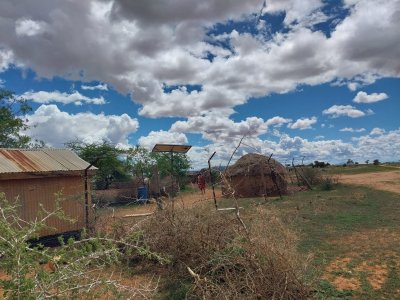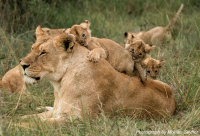|
“Imagine fearfully the night falling and then rolling the dice as to the chance that your livestock livelihood could be destroyed?”

SUMMARY
1. LionAid can report ZERO predation on livestock in Maasai manyattas (villages) equipped with anti-predator solar lights, and ZERO predator retaliation killings in the area bordering Amboseli National Park in Kenya via our joint community programme.
2. The “insurance herd” to compensate other manyattas for losses has grown to over 500 animals and is expected to increase.
3. School children in households equipped with lights are excelling in their schools.
4. The LionAid – Merrueshi Maasai community collaboration is exceeding all expectations for predator protection and improvement of rural community lives.
Click here to listen to Lerionka, a Maasai Elder discussing the project.
UPDATE
Today, we would like to give an update on our amazingly successful venture together with a Maasai pastoralist community bordering the world-famous Amboseli National Park in Kenya - a UNESCO Biosphere Reserve since 1991.
But this national park, like many others in Africa, is too small to be a self-contained ecosystem – Amboseli park is only about 392 km2. Meaning that the viability of the park’s wildlife (and highly profitable tourism income) is greatly dependent on the surrounding lands owned by rural communities, where those “park” animals migrate. And can cause lots of trouble.
In these days of climate change, the problems for the pastoral communities have only escalated. Wildlife herbivores – called “government cattle” by the communities, compete with local livestock for the decreasing amount of grass produced by piddling amounts of rain falling these days.
But more immediately important are the predators walking out of the park and having a nice meal of livestock. To put this in perspective, this is not like a fox stealing a few chickens out of a henhouse in Europe. Large African predators can destroy the entire livelihoods of several Maasai families in a single night – cattle, goats, sheep and even donkeys all gone.
Imagine fearfully the night falling and then rolling the dice as to the chance that your livestock livelihood could be destroyed?
For many years, rural communities took matters in their own hands and destroyed predators that actually or even potentially caused harm.
This is one of the many reasons lion populations across Africa have declined and declined to their current continental estimate of maybe less than 10,000 animals.
LionAid, with the assistance of Maasai elders, came up with a solution. Simple you would say, but never before tried.
Predators like to hunt at night, but don’t like lights around where the livestock are kept. They stay away. The Maasai elders then came up with another solution – provide the villages (manyattas) with solar lights NOT for free, but paid with livestock to build an insurance herd. The herd stays locally of course, and is used to provide one-to-one compensation for losses.
And – equally important, each household in the manyatta is also provided with a solar electric light INSIDE the house. You all might be used to using a light switch, but for so many in these rural pastoralist communities, this was their first time ever. Ever.
So what evidence do we have about our success?
LionAid has engaged elders, women representatives and a chief to give us this crucial information. What they have told us is the following:
1. The manyattas equipped with predator deterrent lights have suffered ZERO predation.
2. The manyattas with lights have provided an insurance herd that has been able to ASSIST their currently “unlit” neighbours with animals from the insurance herd. The insurance herd “account” currently stands at more than 500 animals at least - and will grow further with herd reproduction.
3. The elders, women and the community chief have told us that with lights within their houses, children are now EXCELLING in their schools as they can much better do their evening homework.
And … there has not been a SINGLE retaliation killing of any predator since the programme began.
This is the very best start to an innovative programme designed by local communities in partnership with LionAid.
Now we need to expand on this success unmatched by any other predator conflict resolution programme in Africa. No more retaliation, clear benefits for children and households, and insurance if there should be some unlikely further livestock predation incidents.
Your donor support for this LionAid and our other similarly innovative programmes is as always much appreciated. And by the Maasai community in Merrueshi in the Amboseli ecosystem pilot project.
In Swahili we and our community partners say “Asante”, in Maa we say “Ashe Oleng”, and in English we say “Thank You” for your support.

|





